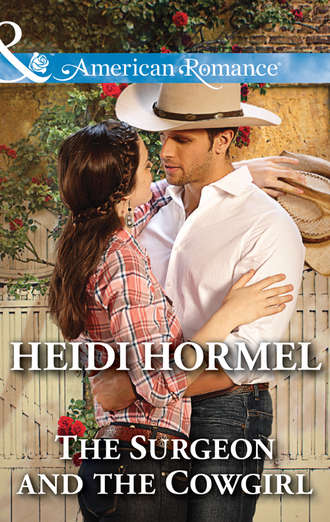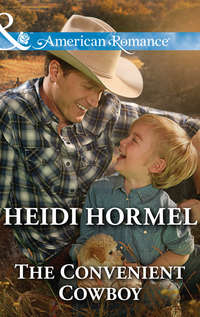
Полная версия
The Surgeon and the Cowgirl
“Your neck is red and not from the sun,” he said softly, his mouth curling a little as his coffee-colored eyes gleamed with a wry humor. “Are you upset?”
She waited for him to laugh. One snort. One chortle and she was taking him down. She regularly wrestled with a half ton of horse. “I am surprised. A barn is the last place I expected you to want to hang out,” she said.
“Times change.”
“You mean it’s snowing in hell.”
“I would think you’d watch your language with all of these children around.”
She didn’t want to fight with him, but he definitely knew which buttons to push. “Do you have any ideas on how you would like to carry out your observations?”
“You mean besides stand and watch?” he asked and grinned.
She worked not to smile back at that smart-ass answer. Those sorts of comments had gotten him into trouble on a regular basis when they were younger. Of course, there were times when the verbal battle that followed such remarks would lead directly to a horizontal two-step, but she was not going there today...or any other day, she told her racing heart. She calmly said, “We’re using the indoor ring. That would probably be the best place to start.”
Payson had told her that he would observe again today. After that, he and the team from the hospital would be at the ranch nearly full-time to see how the program aligned with medical standards. Jessie had never expected that the hospital would take such a hands-on approach, but if she wanted to keep Hope’s Ride operating, she had to accept the invasion. She’d try to cooperate. She really would. It was just tough with Payson as the one coordinating the study by the hospital.
He stood and waited. She got up and limped off through the barn. It had been weeks since her tussle with Alex and the horse, but her knee refused to stop aching. Being short-handed at the ranch hadn’t helped her condition. She’d been doing more than usual, and going to the doctor was out of the question. Until Hope’s Ride made money, Jessie had only the most basic insurance.
Payson followed her, making her even more self-conscious about her gait. In the past, when he’d walked behind her, he’d said it was so he could enjoy how she filled out a pair of jeans. She doubted that was what he felt right now.
“Here’s the indoor ring,” Jessie said. She would pretend he was a donor who was thinking about supporting Hope’s Ride. That would give her the right attitude. “The afternoon sessions are for the younger children who aren’t in school yet.”
He looked at his watch. “I have a consultation at three, so that gives us an hour.”
Jessie almost made a snarky comment. Paste on a smile and be polite, she firmly told herself. She could do that for the next hour. She could do that for however long it was going to take to save Hope’s Ride.
She explained briefly what the volunteers were doing and each child’s therapy plan. Payson asked questions, but his gaze was intent on the children. They stood side by side for a few moments. She could smell the tartness of the starch from his shirt and clearly remembered what that innocent-looking cotton hid. She would not think about how that scent had invaded her senses when Alex made them kiss.
She refused to remember how he had touched her in their big comfortable bed—a whimsical monstrosity that Payson had bought for her because she’d refused to have a diamond ring. During the divorce, she’d told him nastily that she didn’t want anything from their marriage, especially that “stupid” bed. Less than a year later, a stumble by Candy Cane, her Appaloosa, had changed her life as much as marrying Payson at nineteen had. While her damaged knee functioned pretty well, it wasn’t 100 percent and never would be. She’d had to retire from the rodeo.
After a month of sitting at her folks’ house in Tucson and feeling sorry for herself, her parents placed a firm, but kindly, foot on her butt, encouraging her to open Hope’s Ride. The program had been in her someday plans after seeing riding therapy in action at a farm in Ohio. So, after paying her medical bills, she’d used a chunk of her savings along with a little bit of help from her parents and their friends in the rodeo “family” to get started.
Now, every month had become a balancing act of draining her savings as she tried to put off creditors until the payments came in. The problem was that the payments weren’t covering all of the expenses now, and her savings were nearly gone.
“Each of the volunteers and paid staff go through extensive training,” she told Payson. “The mounts have all been donated. We test each one before any child is allowed on. You can see that each rider has a helmet and helpers. It’s very safe. The movement of the horse forces them to—”
“What conditions do you treat?” he asked, interrupting her.
He was a “donor” she reminded herself, and explained the current program and her hopes for expansion. After another five minutes of observation, he suggested that they move on. She took him to the outdoor facilities and to a small room where the children and their caregivers regularly met to speak with the two other therapeutic riding instructors, both of whom were certified. She had help from a couple of part-timers to care for the stock and everyone else volunteered their time and expertise to help the children. She took him into the horse barn. It was empty except for a cat and flies that buzzed lazily in the air.
“The older riders are expected to help care for the horses,” Jessie said.
“Free labor, huh?”
“No, Payson, the children, especially the teens, need that kind of responsibility. They don’t have a lot of confidence in their own abilities. Caring for the horses shows them that they have a lot more going on than they think.”
“Plus a rider always takes care of her own horse,” he said, nodding a little as he repeated the words she’d told him often enough.
“Yep. There’s that, too. It’s also a chance for the kids to really bond with the horses. It’s an important part of the therapy.”
The tour was over, and they were standing in the aisle of the barn. Even with the sun streaming in through the stalls, it was dim, the concrete floor keeping the space cool. Jessie couldn’t see Payson’s expression, but his stance was taut. She shifted to give her knee a rest.
He took her arm and said, “That’s it. You’re going to let me look at that knee.”
She started to pull away but his fingers tightened. Her arm tingled where he touched her skin. “It’s fine, Payson.”
“It is not fine. You were limping the last time I was here, and you’re still limping.”
“I have an appointment for next week.”
“No, you don’t. You’re lying. You turned your head,” he said.
Darn it. How could she have forgotten that he knew her better than anyone else?
“You’re a kid doctor. I’m an adult,” she said.
“A knee is a knee. Do we have to go through this again? I wanted to look at it the last time I was here.”
“I said no then, too. You don’t owe me anything, Payson.”
“Who said anything about owing you?” he asked. “I’m trying to fulfill my duty as a physician.”
* * *
PAYSON GRITTED HIS TEETH. Why did Jessie have to make things so hard? She had this idea that if she didn’t do things herself, people would never respect her. So, here they were glaring at each other. The way she favored her leg, it must be excruciating.
When they’d been married, she’d often ridden with something pulled or strained. Jessie was used to being hurt and not showing it. He remembered her eyes shining with tears more than once and her fighting to keep them from spilling down her cheeks. The code of the rodeo, she’d told him. “You don’t let people see you cry no matter how much you hurt.” It was all about respect. That was what was driving her to limp around on a knee that needed rest and attention.
He glanced at his watch. He was already late for his consult, and he tried to ignore the hitch in his stomach from the same tug of war that had strained their marriage: patients or Jessie. With more heat than he intended, he said, “You need to have that checked out.”
“I will if it doesn’t get any better.”
He followed her from the barn, his concern as a physician fighting with his intense arousal as he watched her tall, lithe body shift under her just-tight-enough clothing. In the old days, even when he’d been exhausted during his surgical residency, following her around like this would have made him hot enough to not care about schedules or exams. He would have dragged her into one of the stalls and...
Why would he remember any of their marriage fondly? Sure, it had been amazing when their problems could be solved by a little time together in bed. When they had to deal with the real problems, grown-up problems, everything fell apart.
“I’ll see you tomorrow at ten. I’ll be done with rounds by then,” he said as he got into his Range Rover.
“I’ll have the releases you requested ready and the therapy plans, too. ’Bye,” she said and turned without another word.
He jammed the SUV into Drive and gravel spit from his tires.
* * *
AS HELEN, HIS office manager, laid out the medication and instruments he requested, she said, “A doctor who makes house calls? Wait till I tell your other patients, they’ll be lining up.”
“Thank you,” Payson said, giving her an aggravated look.
“Oooh, the Dr. Mac evil eye. I’m so scared,” she said and laughed. “Based on what’s being said in the halls, I’m guessing this has to do with Jessie?” Her voice had gone from joking to aggravated.
“The grapevine is pretty quick,” Payson said. He was irked that he and Jessie were being discussed, but it was a hospital. There was no way to stop the rumors. He needed to stay focused on his final goal: becoming director of pediatrics. It had been made clear to him that moving up at the hospital now depended on the success of the program. He and his team were expected to bring Hope’s Ride into compliance with the hospital’s goals and policies.
“It’s a practical thing,” he explained to Helen. “She’s got to be at a hundred percent if I want to get her program integrated with ours.” He saw Helen start to open her mouth and he looked at her from beneath slightly lowered brows. That one gesture had been known to quiet children in a full tantrum. “She injured her knee saving Alex Suarez. Even you have to agree that examining her is the least I can do as a doctor. I’m sure she doesn’t have very good insurance. Plus, I need to speak with her about the hospital’s requirements.”
“I would guess that there are hundreds of doctors in the greater Phoenix area who would treat her,” Helen said. She straightened the stacks of paper on his desk, her mouth tight and disapproving. Payson imagined it was how a mother would look when her child had acted up. His own mother had always let the nanny or school take care of it when Payson or his brother misbehaved.
“I’ve got to finish up,” Helen said. “My son has a lacrosse game this afternoon.”
When she left, Payson focused on the consult he’d just had and the endless paperwork for his other patients. He knew that, as director of pediatrics, most of his day would be filled with paperwork like this. That was the downside. As he’d told Helen again and again, he could be more effective in helping care for children as director. What he would never admit was that by becoming an administrator and sacrificing what he really loved—performing surgery—he might finally make up for not being able to save the one small life that had mattered more to him than any other.
* * *
JESSIE SAT STIFFLY in her office chair as Payson pressed and poked her knee. She’d only agreed to let him check the joint after he’d refused to continue the evaluation of Hope’s Ride until she let him examine her. She wanted to squirm away but felt stupid because he didn’t seem affected by nearly lying in her lap as he prodded the knee. Her skin prickled with awareness and she ground her teeth against the moan...of pain. Definitely pain.
“When are you going to have this knee replaced?” he asked as he sat back on his heels.
She relaxed a little. “I’m not. At least, not until I’m ninety.”
“You’re dreaming. I’m sure the surgeon told you that this reconstruction was temporary at best. That knee will need to be replaced. Probably sooner rather than later,” Payson said as he put away his instruments and kept his back to her.
“It works fine for what I do now. I just tweaked it helping Alex. Now, can we get started? The kids are waiting for us,” she said. She went to the door, trying hard not to limp.
Payson followed her outdoors, where children were preparing to mount up. The pony, Molly, trotted around the ring, herding stragglers toward the volunteers and caregivers. The hospital observers stood clear of all the commotion. It took a good fifteen minutes to get the children settled and the therapy started. Even so, there were stops for tears and more than one potty break.
“Is this how the program usually operates? I don’t remember observing this sort of chaos previously,” Payson asked.
“More or less. We’re careful to not push the children too hard. They are fairly new to riding. We don’t want to make them hate it before they discover the joy,” Jessie said.
“There definitely needs to be more structure,” he said as he made a notation.
“I understand why you may think that, but I am trained, you know. I’ve found that—”
“I understand that you took, what, a one-year course?” Payson asked without looking up.
He made it sound as if she didn’t know what she was doing, just like when they’d been married.
He went on as he closed his notebook and looked her in the eye. “I wanted to let you know that I had a meeting this morning before I came out here. There are additional concerns about the program and the affiliation.”
“You mean concerns that you brought up. I should have known there was no way you would give the program a fair evaluation.”
“I’m not any more thrilled about this situation than you are. It has been made completely clear to me that to become director of pediatrics, I’ve got to work with you to get this program ready for an affiliation with the hospital.”
“What the hell does that mean?”
“Jessie, language.”
“I only swear when you’re around.”
“I doubt that,” he said and looked out over the ring. The youngsters rode slowly with big grins on their faces. “I gave a brief report this morning to the committee, and they decided that their involvement needs to be more extensive.”
“Than what? You’re here with who knows how many others. I lost count,” Jessie said.
“I’m going to bottom-line it. The hospital will be overseeing the program while all of the departments do their evaluations and make their recommendations for changes and upgrades to increase efficiency and effectiveness.”
“Payson, please follow me,” Jessie said tightly. She could not have this conversation anywhere near the children because she was going to be yelling and possibly committing murder. When they were fifty feet from the corral, she turned to him. “This is my program. I know I contacted you, but just to ask who I should talk to at the hospital. I never asked for you to take over. You always have to be the one in control, don’t you? You can’t let me do this on my own. It’s just like when we were married. You were always trying to improve things—like telling me I should go to college and diagramming the most economical way to do laundry.”
“Jessie, if I want to be named the director I’ve got to make this program work for the hospital. It’ll be good for you, too. There are a number of departments that are chomping at the bit—pardon the pun—to use your program. It doesn’t hurt that, according to the public relations guy, Hope’s Ride will make the hospital look ‘progressive and forward thinking.’”
“So the children don’t matter? It’s all about image and your promotion? I’m the one in charge here. It’s my program,” she said, hoping she sounded stronger than she felt. Had she hoped he’d come back for her? Not to climb up the hospital rungs?
“Jessie, if you don’t work with me and the others, the hospital will cut off any association. I know a few doctors have given the program a try. They will take away their patients and no one else will refer children to you. It won’t take long for word to get around that there must be something wrong since Desert Valley Hospital won’t refer anyone.”
If she wanted her program to continue, she had to give in. If she were a millionaire, like the members of the hospital’s board, she could tell them to take a flying leap.
“By the way, I did convince the hospital to give you a stipend out of my budget while I run the program.”
“Excuse me. Back up. You’re going to be doing what?”
“I’ll be in charge of Hope’s Ride while the hospital staff is here.”
“You’ve got to be kidding me. You’re going to be my boss?”
Chapter Three
“I won’t exactly be your boss,” Payson said.
“You’re paying me. You’re telling me what to do. Seems like that’s exactly what a boss does,” Jessie fired back.
He was wary because when she was upset, she sometimes acted before she thought. “If you want the hospital to list you as an endorsed program, you’re going to have to accept this condition for now.”
“Fine. I’m sure you’re happy, Dr. Control Freak.”
“If I were your boss, comments like that would get you fired,” he said, only half-joking.
“Good thing that you’re not ‘exactly’ my boss then.”
“Maybe setting some ground rules would help. I’ll give you a written list of the protocols that will need to be followed. That’s not my choice. It’s the hospital’s rules.” He saw her lips go from full to thin and waited for the explosion.
“I understand,” she finally said, not looking any less annoyed but sounding...resigned.
“Great. That’s a start,” he said.
Her capitulation didn’t make him feel like they were on better footing. He didn’t want her program to fail. He’d never wished that anything bad would happen to Jessie—at least, not anymore. The first few months after the divorce, he might have hoped that she’d have to ride rodeo in Siberia.
They talked for a few more minutes. By the end of the conversation, Payson thought there was a good chance that the two of them could work together with minimal conflict. He hoped so, because his future had been firmly tied to Jessie’s by the hospital. “Tomorrow, we’ll plan for the team from physical therapy to observe. They talked about wanting to stay for two weeks, then they’ll make recommendations. At that point, we’ll discuss how to assess the success of those improvements.”
“Improvements? Yeah, I can already see the improvements, like making sure that you don’t let the kids actually near the horses, or filling out useless forms because you want to have documentation.”
“Jessie, there are certain standards that must be met, but I’m sure we can find compromises. That’s why we’re here—to determine the best way to proceed and benefit both of us,” Payson said, wondering if that sounded as pompous as it did in his head.
“Save the bullsh—you know what. I know there’s no use arguing with you. I’ll save it for the therapists. I have a feeling they’ll be more reasonable anyway,” she said and went on before he could protest. “I’d like to set up an orientation for all of your staff. I know they know their jobs but most won’t have worked around horses. Even my volunteers who are horse people have to go through orientation. It keeps everyone safe. Why don’t you join the first group—that’ll let everyone know how important it is.”
Was she suggesting that he wasn’t taking the collaboration seriously? “Absolutely,” he said. “Administration 101—lead by example.”
“Yeah, I guess,” she said, looking at him oddly.
In the spirit of working together, he didn’t comment. He didn’t have the time anyway. They were largely silent as they headed to his Range Rover, when Jessie said tentatively, “Alex’s next therapy session might be a good chance for you to observe.”
He paused and wondered if this was a Jessie-style olive branch. “I’ll have to check my schedule.”
“Great. See you at orientation,” she said.
“See you then,” he said. They stood by his SUV. Jessie scuffed the dirt with her boot. Should he shake her hand? No. Even that small contact would stay with him the rest of the day, making him aware that his physical desire for her—and that’s all it was, he assured himself—hadn’t gotten the memo about the divorce and the three years apart. He did wave as he bumped down the lane.
* * *
“EVERYTHING’S FINE, MAMA,” Jessie said patiently into her cell. “The hospital is really happy with the program. It won’t take long for them to give me the okay.”
“If you need money, you let Daddy and me know,” her mother said.
Jessie would only accept more money if the horses were going hungry. Her parents and everyone else had already helped her so much—she couldn’t ask them for anything more. “I’m good, Mama.”
“Are you sure? I know it’s gotta be tough working with Payson. I know how badly he hurt you,” her mother said, a tsk in her voice. Her mother had been equally disappointed with Jessie and Payson when the marriage had ended.
Jessie didn’t want to talk about what had happened. She’d let go of the sadness and the resentment—she’d been sure—or she’d never have called Payson about Hope’s Ride. Since he’d shown up, she’d been replaying their marriage, both good and bad. It all got on her last nerve. “Mama, Payson and I are doing fine. This is about Hope’s Ride and him moving up at the hospital. It’s just business.”
“Mm-hmm,” her mother said. “I’m not too partial to those TV advice doctors, but you know they’re always asking people, ‘How will that work for you?’ So, how do you think that’s going to work?”
“I told you, it’s business.”
“That’s what you said. But, really, darlin’, how can it ever be strictly business between the two of you?”
“We’re divorced, Mama. That’s all there is.”
“You know how I feel about that divorce,” her mama said, “but that horse left the barn years ago. Do you think this is your chance to settle things between you? You know, talk about—”
“We are not talking about the past. That’s over. This is about Hope’s Ride.”
“Is it in the past? Why did you call Payson in the first place?”
Jessie knew this answer. “Because he works at the best pediatric hospital in the valley.”
“Mmm-hmm. What about that teaching hospital that was looking for programs that use alternative therapies? I remember Daddy tellin’ you about it. He saw it on the news.”
“Desert Valley is better,” Jessie said stubbornly.
“Darlin’, that may be true, too, but that’s not why you called Payson.”
“It’s the only reason, Mama. Hope’s Ride needs to be endorsed by and affiliated with only the best hospital. Plus a lot of my kids have doctors there.”
“And at every other hospital in the valley. You are a very smart girl. Even you should be able to figure out why you called on Payson when you were in trouble.”
“It’s business, Mama,” Jessie said, and even she could hear the desperation in her voice. Business was the only reason. She was over Payson. She was the one who’d filed for the divorce, for goodness’ sake. “Having Desert Valley’s stamp of approval will give me a cushion and let me expand in a few years, branch out to help more children.”
“Any hospital could have given you that cushion.”
“Mama, I have to go. I have orientation for the hospital staff today, and then we’ve got a full day of therapy,” Jessie broke in.
Her mother gave a gusty sigh. “Baby girl, you know I love you no matter what. But I swear you and Payson need your heads knocked together. Just business. Not likely. Now, you go and get to work.”
It was hard to get her mother’s voice out of her thoughts. In the dark days when Jessie had been considering divorce, Mama had counseled against it. Instead, she said that Jessie and Payson needed to talk and maybe see a professional. Jessie had tried to follow that advice, but it didn’t help that when they could actually find time to talk, one of them was always tired and distracted. Their discussions quickly broke down into hurtful fights.






